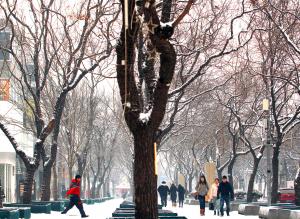Dec. 26 (UPI) — A study has found that human influences have decreased the likelihood of an extreme cold event like the one that took place in China in January 2016.
The study — published in the Bulletin of American Meteorological Society — sought to determine how human influences have affected the likelihood of a strong cold surge like the one that broke daily minimum temperature records from Jan. 21-25, 2016.
The surge caused temperatures to drop by between 50 degrees and 64 degrees, resulting in the lowest temperature recorded since modern meteorological observations started in 1960 amid a warming winter trend in 2015 and 2016.
Researchers from the Institute of Atmospheric Physics, Chinese Academy of Sciences, China Meteorological Bureau, Met Office Hadley Centre of U.K., University of Reading and University of Edinburgh determined human influences made the reoccurrence of such an event less likely.
“Anthropogenic influences are estimated to have reduced the likelihood of an extreme cold event in mid-winter with the intensity equal to or stronger than the record of 2016 in Eastern China by about 2/3,” the study’s author, Qian Cheng of IAP, said in a press release. “Still, we caution that even under human-induced warming, extreme cold events can still occur as a result of natural variability.”
The study found that cold winters in China are expected to become rarer due to a warming climate and that, absent human influence, the probability of an extreme cold event like the one in 2016 would have been more than double.

COMMENTS
Please let us know if you're having issues with commenting.